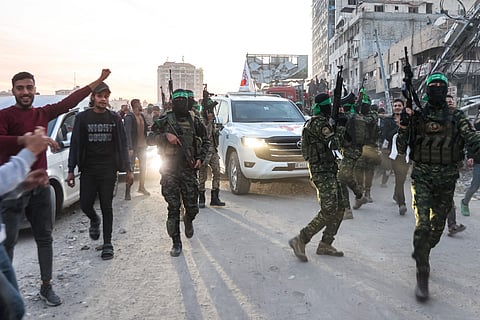Gaza challenges mount: What comes next is far from certain
Israel has ruled out Hamas and the PA running Gaza but hasn’t specified an alternative

Gaza: The Gaza ceasefire has entered a second day, with hundreds of aid trucks cleared to enter the war-ravaged strip after the initial hostages-for-prisoners exchange.
What comes next is far from certain.
Israeli Prime Minister Benjamin Netanyahu’s administration has been jeopardised by the US-backed deal, with one far-right cabinet member pulling his faction out of the ruling coalition in protest.
A second, Finance Minister Bezalel Smotrich, has vowed to follow suit if the 15-month war against Iran-backed Hamas doesn’t resume in six weeks. That could create a minority government.
In Gaza, the question of who will run the territory of 2.2 million people and oversee rebuilding efforts is unresolved.
Hamas militants, masked and armed, poured into the streets after the ceasefire was confirmed to show they haven’t been defeated.
Meanwhile, the Palestinian Authority, which controls part of the West Bank but was formally pushed out of Gaza by Hamas in 2007, says it’s in charge, issuing video footage of the group operating bulldozers and instructing banks to resume services.
Israeli officials confirm the PA will soon start to play a role administering the passage of aid through the Rafah crossing from Egypt to Gaza, along with representatives from the European Union and a private US security company. This is similar to the arrangement before 2007’s military coup, although the PA has continued to fund and influence various policies in Gaza since then.
Israel has said that neither Hamas nor the PA will be permitted to run Gaza, although it hasn’t said who will.
Another factor is the fate of hundreds of thousands of Palestinians who have been forced out of northern Gaza, many of whom are expected to try and return home despite the area’s almost total devastation by Israeli bombardments. Temporary housing will be provided, but if the fighting resumes, they’ll be in acute danger.
Two phases
The Israel-Hamas ceasefire, mediated by Qatar and Egypt as well as the US, specifies a six-week process whereby 33 Israelis are released for some 1,900 Palestinians based on a complicated formula — 30 prisoners for civilian hostages, 50 for soldiers. The next exchange is Saturday. At the same time, Israeli troops are due to retreat to the periphery of Gaza while humanitarian aid enters.
In two weeks, the sides are scheduled to begin negotiations for the second phase of the truce, which is aimed at a permanent end to hostilities and a full exit of Israeli forces. Netanyahu has repeatedly said there can be no such arrangement without the removal of Hamas from military and civilian authority, increasing the likelihood of the war restarting.
If that happened, more than 60 hostages would remain in captivity, something many Israelis say they won’t tolerate.
“National security will suffer unless all of the women and men being held captive return home,” wrote veteran commentator Ron Ben-Yishai in Yedioth Ahronoth newspaper on Monday, reflecting a majority Israeli view based on opinion polls. “Otherwise, this will remain an open wound that will have destructive consequences.”
Netanyahu’s recent statements suggest that if Hamas doesn’t resign during the upcoming talks and hand over its arms, the war will restart. Hamas statements make clear it has no such intention.
That said, Palestinian Authority officials, speaking on condition of anonymity, say Hamas knows it can’t continue to rule and expect reconstruction funds to be released by foreign governments. The two sides are quietly discussing how to bring the PA back without humiliating Hamas leaders, they say.
This too goes against Israeli wishes, but much depends on how incoming US President Donald Trump sees the situation. While the outgoing administration of Joe Biden took part in negotiations for months, a recent push by Trump was crucial in getting an agreement over the line.

